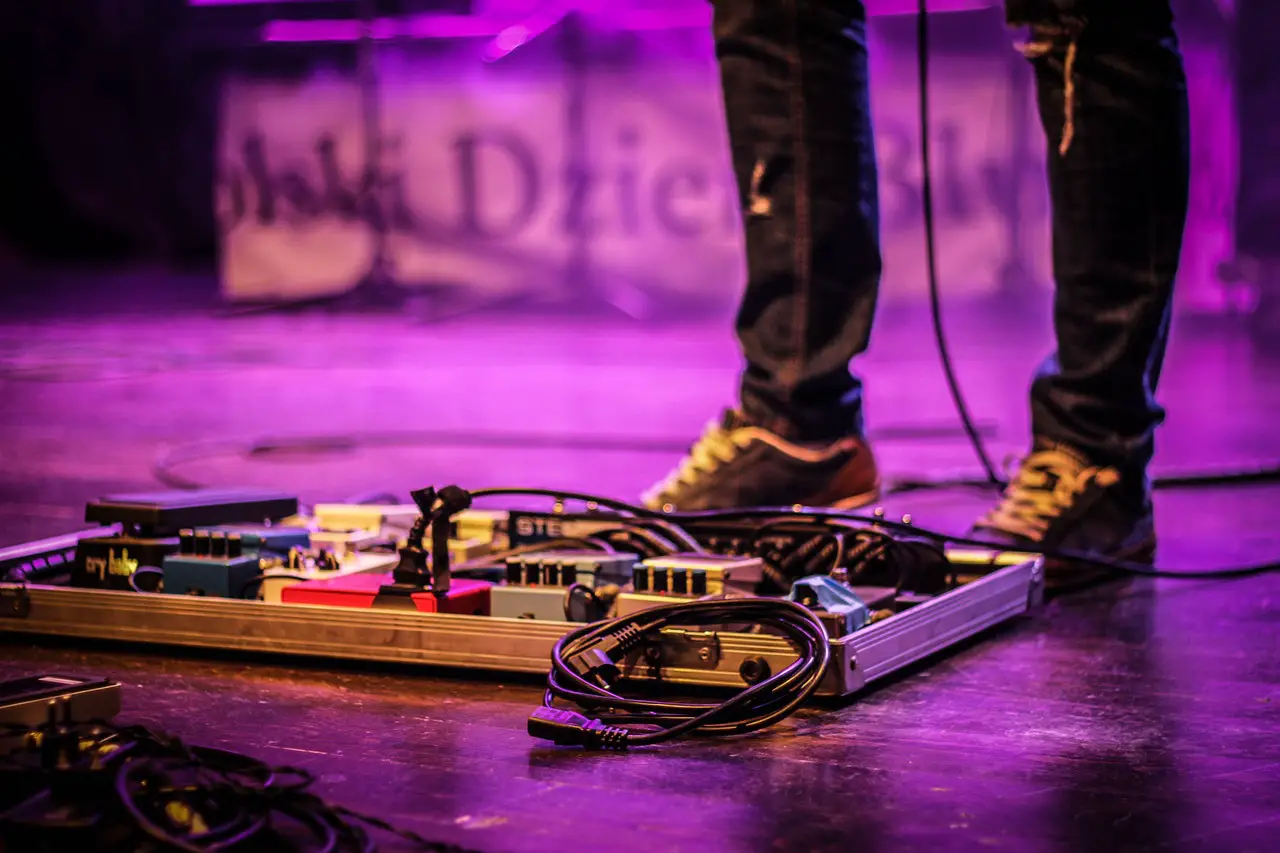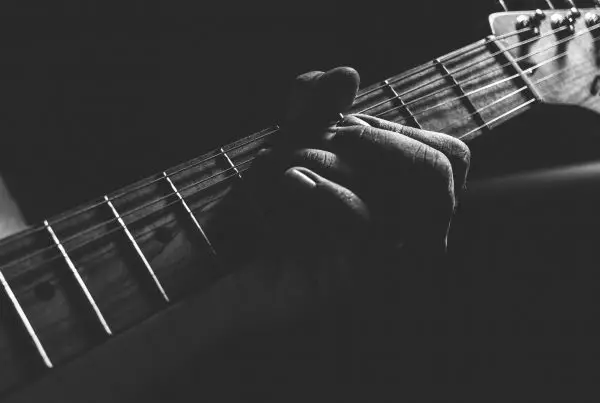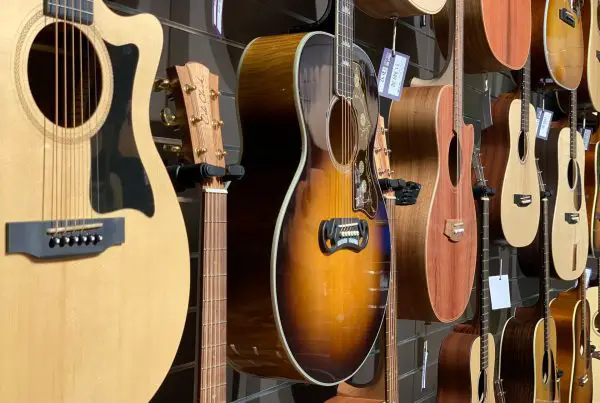Guitar pedals making unusual noises like crackling, popping, and buzzing could result from a wrong power supply. The noises could also be because of the pedal itself. AC power leaking into your signal causes consistent buzzing. A loose connection in the pedal often causes crackling.
Sometimes your pedal passes the signal and works properly but makes it seem unusually noisy, which is not pleasing to the ears when you play the guitar. Several reasons could be causing the problem.
Noisy guitar pedals can really make your guitar sound unpleasant and unappealing. All parts of your signal chain should be quiet when they are not being used.
Depending on the origin and the type of problem, pedals can make crackling, popping, or buzzing sounds when they are engaged with.
But you do not have to worry, your guitar pedal is not faulty, and the problems can be fixed.
I have faced pedal crackling and buzzing problems in the past as well, but with time I learned how to fix them and make the noises go away!
In this article, I will share the reasons that are maybe causing these unpleasant noises and simple yet effective ways of fixing them. The following topics will be highlighted in the article:
- 3 reasons for crackling, popping, and buzzing.
- Why is your pedal crackling, and how to fix it?
- Why does your pedal pop, and ways of fixing it?
- Why is your guitar pedal buzzing, and how to stop it?
Also Read: Complete Guide To Stop EVERY Type Of Buzzing Noises For Amp!
3 Reasons Why a Guitar Pedal Crackles, Pop, and Buzzes and How to Fix Them
Following are a few of the most common reasons why your guitar might be making these unpleasant sounds and how to fix them:
1. Faulty Power Supply
Using the wrong or faulty power supply can lead to noise and buzz and cause your pedal to get damaged. An underpowered or cheap power supply can result in your pedal crackling, popping, and buzzing.
If you suffer from a buzzing or crackling pedal, the first thing that you should do is check the power supply to the pedal and make sure that it is consistent and not low-powered.
A generic power supply should not be used with pedals. First, it should be designed for effects such as it should be regulated, which means the voltage should not drift. Secondly, the power supply should be filtered, which means there should be no noise from the AC line.
Low battery life can also have a bad effect on your pedals and cause them to become noisy, so it is better to invest in some good quality 9-volt power supply so you can avoid this problem.
2. Dirty Potentiometer (volume knobs)
A common source for noises like crackling, popping, and buzzing when a pedal is engaged is its dirty potentiometer or, as it is commonly known, ‘pot.’ A dirty pot will usually produce a crackling sound and can be fixed by cleaning it.
The potentiometer is the inner part of the dial that controls the amount of current passing through it. If dirt or dust gets settled in, it will interfere with the current, producing a crackling sound when the pedal is used.
If you hear a crackling sound and deduce that the pot is the source of the noise, then it is smart to clean the pot.
To do that, you can unscrew the front of your pedal and use any small brush to get rid of the dust on the inside. You can also use cleaner spray or lubricant to clean the dirt that gets settled on the interior.
Spray the cleaner on each of the pots, then plug the pedal in and engage with it. Voila! The crackling sound will most likely disappear.
3. Voltage Leakage
A common cause of your guitar pedals making unwanted noises like pooping sounds is that the capacitors inside the pedal leak a small amount of DC voltage that gets buildup in the input and/or output. When discharged into the signal path,, this buildup leads to a pop sound.
The pop that is produced due to the leak of a tiny bit of voltage in the circuit inside the pedal can be quieter or louder depending on the quality of the capacitors that are used and the nature of the effect, which means that pedals with high gains usually produce a higher pop.
One way of getting rid of this pop sound is by adding pull-down resistors to the input and output of the signal path. The small charge that gets leaked is now drained through the pull-down resistors, eliminating the voltage buildup on the input and output.
Why Is My Guitar Pedal Crackling?
One of the main reasons your guitar pedal is crackling is that your volume potentiometer (knob) is dirty. The wiper of the potentiometer can build up dirt and dust, especially on the amps if there is an open-back cabinet.
Rotary potentiometers, like volume knobs, have a friction surface inside, so when you use them, the residue from the friction wear will interfere with the electrical contact inside.
Moreover, environmental dust can also get inside a perfectly sealed guitar pot. This leads to crackling noises.
Inconsistent crackling sounds could also be due to a bad connection in the pedal, which could be in one of the jacks, wires, or the switch.
Moreover, these noises could also be because of a sick or poor component.
How to Prevent the Guitar Pedal From Crackling?
To prevent your guitar pedals from crackling, make sure that you clean them frequently and do not let the dirt and dust settle in the pot. You can clean the pot using a electrical cleaner spray or lubricant.
Cleaner sprays can get inside the pot and clean the dust or dirt on the pot. However, they can also speed up the wear process due to friction and cause even more dirt sooner or later.
A good but more expensive option is the cleaner lubricant. It is applied by removing the knob, inserting the tube into the seam of the pot, and then turning the pot several times.
Another way to stop the crackling sound is to replace the volume pot with a new one, as cleaning it may not be that ideal as a long-term solution.
Here’s a great YouTube video showing you how to clean your guitar knobs.
Why Does a Guitar Pedal Pop?
A pedal produces a ‘pop’ sound mainly because the capacitor in the circuit leaks a small amount of DC while the pedal is in the bypassed state. When the pedal is played, the capacitor charges back up to the original operating voltage leading to a ‘pop’ sound.
Capacitors are used to block DC voltage, but they will leak a tiny bit of voltage occasionally, which builds up a charge potential. When the pedal is used, the built-up voltage is discharged into a single path, creating a pop sound.
If your pedal keeps popping every time you switch it, there may be a voltage difference somewhere that leads to a discharge every time you engage the pedal.
Pedals often ‘pop’ when switched on because of the discharge of the static electricity buildup inside them.
How Do You Fix a Popping Pedal?
To fix the popping pedal, it is important to clear out the static buildup of the voltage difference and stop the capacitors in the circuit from leaking DC voltage.
The accumulated DC voltage needs to be eliminated to stop the popping sound. For that, anti-pop or bleeder resistors can be added at the end of the pedal. It takes the lines to the ground, which gives the built-up voltage a place to bleed to.
However, this can only remove some of the built-up voltage, and there may be too much for the bleeder resistors to remove quickly.
You should install better quality capacitors as the low-quality ones have higher leakage.
Using a high-quality power supply for your pedals can also make a difference.
Why Are My Guitar Pedals Buzzing?
If you can hear your guitar pedals buzzing, it may be because AC power is leaking somewhere in your signal, or the buzz could also be caused by bad ground. Excessive buzzing could also be due to bad electronic components.
The buzz results from AC power making its way into the circuit and getting amplified. Poorly regulated AC adapters often cause this because of their inadequate filtering.
The buzz could also result from a ground loop occurring in your signal chain. A ground loop occurs when there is an unintended connection to the ground, two or more devices connected to a common ground create a high-frequency buzz.
How Do I Stop My Guitar Pedals From Buzzing?
You can stop your guitar pedals from buzzing by rewiring your guitar because it is usually caused by bad soldering or poor connection.
To get rid of the consistent buzz, inspect all the wires. If you find a loose wire, melt the connection, get rid of the residue, and then solder the wire back to the terminal properly.
To eliminate ground loop noise, isolate the two audio sources from each other, preferably using a transformer.
Here’s a YouTube video showing you how to fix that annoying buzzing.
How do I Locate the Source of the Noise in my Guitar Pedal?
You can locate the source of the noise in the guitar pedal by opening up your pedal and examining the inside with the help of some conductive devices.
To pinpoint the source of the noise that is coming from your guitar pedal, firstly open up the pedal while it is connected to the guitar and the amp and then reduce the volume of the guitar to the minimum level.
Now you can investigate the inside of the pedal with the help of any conducting device, which will help you locate the source of the noise, which could be a faulty connection, a bad solder joint, or any other faulty component on the board.
Final Thoughts
There are various reasons for noisy pedals that make crackling, popping, and buzzing sounds, including underpowered or cheap power supply, a dirty potentiometer, or DC voltage leakage inside the circuit.
It is important to take note of the type of undesirable noise that is being produced so that you can find its origin and work on fixing it.
Having a correctly powered good quality power supply, a clean potentiometer, and/or anti-pop or pull-down resistors to the input and output of the signal path can eliminate unpleasant crackling, popping, and buzzing sounds from your guitar pedals.






